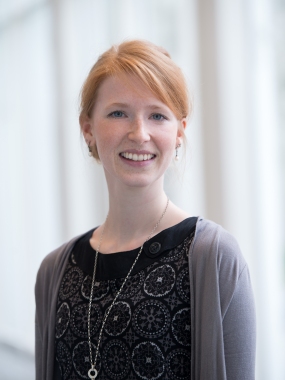Alina Steinbach receives the Nicola Werner Prize for cancer research
In her doctoral thesis, Alina Steinbach identified a mechanism by which HPV-positive tumor cells manage to escape an attack of the immune system. On Friday 16 December 2016, she received the Nicola Werner Prize for her work. For the 2000 Euro prize money, family and friends of the artist Nicola Werner, who died from HPV-related cancer, pedaled hard in a sponsored cycling marathon- continuing Nicola Werner's mission: to drive preventive work and research into human papillomavirus (HPV) forward.
For several years, it has been possible to vaccinate and protect patients against an infection from some carcinogenic HPV types. However, the vaccine is powerless if the cells are already infected or have even mutated already. Therefore, the research group Immunotherapy and Prevention at the German Cancer Research Center (DKFZ), headed by Angelika Riemer, is researching a therapeutic vaccine. It is designed to train the immune system to detect and destroy virus-infected cells.
This is not an easy task: the malignant tumors caused by the HPV infection are able to avoid presenting antigens such as the viral proteins from the cell interior on their surface. For a therapeutic vaccine, it is however important that the T cells of the immune system are able to distinguish the tumor cells from healthy cells and can thus specifically target them.
In her doctoral thesis Alina Steinbach therefore investigated what exactly happens inside HPV16-positive tumor cells during processing of the viral antigens, the so-called antigen processing. She came across an enzyme that in healthy cells is responsible for cutting up proteins in a way that makes them fit on the "display area" on the cell surface, the so-called MHC molecule. In the cancer pre-stages and tissues investigated, this enzyme was produced excessively, but the viral antigens failed to land on the cell surface. Steinbach then throttled the production of the enzyme in the HPV16-positive tumor cells, whereupon certain T cells recognized and attacked the infected cells. The HPV16-positive tumor cells appear to protect themselves against attacks from the immune system through an over-expression of this protein. "We now want to use this knowledge to create a therapeutic immune response," says Alina Steinbach. "The Nicola Werner Prize will help us to achieve this."
For her work, Alina Steinbach now receives the Nicola Werner price worth 2000Euros. It is named after the artist Nicola Werner, who fell ill in 2008 with a HPV-related tumor and campaigned relentlessly to raise awareness for preventive options like a vaccination. Since her death in the spring of 2016, her husband Moritz Werner has been continuing her mission: In September, in memory of Nicola Werner, friends and relatives organized a sponsorship cycling marathon from Paris, where the family lives, to Cabourg in Normandy. The 54-year-old's guiding principle printed on their jerseys gave them extra strength: "Live the music that plays inside of you". They managed to raise 4000Euros. The other half of the prize money recognizes HPV research work at the Institute Gustave Roussy in Paris. The Institute Gustave Roussy is currently exhibiting the artist's paintings as well as a photo documentation of her medical history. Her work was already on show at the DKFZ in the summer, entitled "Kunst gegen Krebs".
An image for this press release is available for download at:
www.dkfz.de/de/presse/pressemitteilungen/2016/bilder/DKFZ_NicolaWernerAward_Alina-Steinbach.jpg
Legend: Alina Steinbach has been awarded the first Nicola Werner Prize.
Note on use of images related to press releases
Use is free of charge. The German Cancer Research Center (Deutsches Krebsforschungszentrum, DKFZ) permits one-time use in the context of reporting about the topic covered in the press release. Images have to be cited as follows: "Source: Tobias Schwerdt, DKFZ".
Distribution of images to third parties is not permitted unless prior consent has been obtained from DKFZ's Press Office (phone: ++49-(0)6221 42 2854, E-mail: presse@dkfz.de). Any commercial use is prohibited.
With more than 3,000 employees, the German Cancer Research Center (Deutsches Krebsforschungszentrum, DKFZ) is Germany’s largest biomedical research institute. DKFZ scientists identify cancer risk factors, investigate how cancer progresses and develop new cancer prevention strategies. They are also developing new methods to diagnose tumors more precisely and treat cancer patients more successfully. The DKFZ's Cancer Information Service (KID) provides patients, interested citizens and experts with individual answers to questions relating to cancer.
To transfer promising approaches from cancer research to the clinic and thus improve the prognosis of cancer patients, the DKFZ cooperates with excellent research institutions and university hospitals throughout Germany:
The DKFZ is 90 percent financed by the Federal Ministry of Education and Research and 10 percent by the state of Baden-Württemberg. The DKFZ is a member of the Helmholtz Association of German Research Centers.


